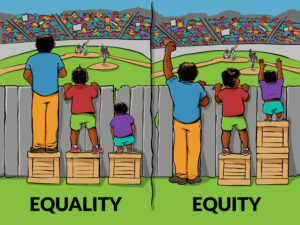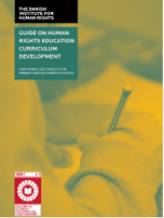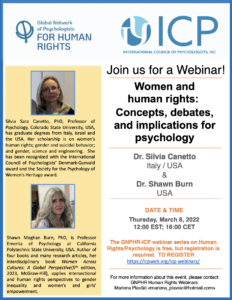
Editor’s Note:
The GNPHR Bulletin focuses each month on a specific topic chosen in accordance with relevant UN events or UN commemorative days for that month. The February theme coincides with the World Day of Social Justice, February 22
Table of Contents
GNPHR NEWS & Events
Special Section: UNITED NATIONS WORLD DAY OF SOCIAL JUSTICE
CONTENT AREAS: ARTICLES AND NEWS
- Covid-19
- Crimes against humanity
- Human rights education
- LGBTQI+, Gender Rights
- Mental health and human rights
INTERNATIONAL HUMAN RIGHTS NEWS
REGIONAL HUMAN RIGHTS NEWS
PUBLICATIONS
EDUCATION, CALL FOR PAPERS, GRANTS
End Notes
GNPHR NEWS
Webinar Series – Human Rights and Psychology
Next Webinar: March 8, 2022 – Women and Human Rights: Concepts, Debates and Implications for Psychology
See Recording of Inaugural Webinar: Human Rights – How Are They Important to the Profession of Psychology
Webinar Series: Psychology and Human Rights
The webinar series on psychology and human rights was launched!
We are proud and happy to announce that Nora Sveaass and Mike Wessells held the inaugural webinar in the Psychology and Human Rights webinar series on 27 January 2022 with the topic Human rights: How do they matter to the profession of psychology? They used fictional and real life examples to show why it is important for a psychologist to know about and protect clients from human rights violations. The discussion after the presentation addressed various topics, including conflicting rights, social activism, and more. Because the discussion raised several questions and issues, we will post a written Q/A on the GNPHR website on the website page.
If you missed the live webinar, you can watch and listen to it here . The webinar hosts Andrew Simon and Merry Bullock, and the moderator was Marlena Plavšić. The series will continue with webinars every 2 months. The International Council of Psychologists and the Global Network of Psychologists for Human Rights are the organizers of the series.
Invitation to Contribute to GNPHR
- Share Real Life Examples and Experiences
One of the best ways to illustrate the intersection of psychology and human rights is through example. We are looking for examples of your encounters with human rights issues in your professional life. You might a time when you protected (or failed to protect) human rights, or advocated for what you saw as a human rights issue. The events might be in your clinical, research, academic, applied, or volunteer work. Please send your narrative / story (500-1000 words) to Marlena Plavšić, marlena_plavsic@hotmail.com . We will compile these for publication in the GNPHR Bulletin and on the website.
- Contribute to the blog/opinion series!!
We invite you to contribute a blog or opinion piece on general human rights issues; human rights education or strategies for raising the profile of human rights within your professional life. Students are also welcome to contribute, including on student needs for learning about and addressing human rights. Please contact the GNPHR Blog editor (blogeditor@humanrightspsychology.org) with ideas for the blog you would like to write!
- Send articles/news/events
If you come across a human rights article or news, or know of an upcoming hunman rights event, please send for publication in the Bulletin. Send to the Bulletin editor Polli Hagenaars at polli.hagenaars@gmail.com
SPECIAL SECTION

United Nations World Day of Social Justice – 20 February 2022
Social justice is an underlying principle for peaceful and prosperous coexistence within and among nations. We advance social justice when we remove barriers that people face because of gender, age, race, ethnicity, religion, culture, sexuality or disability.
Events: http://www.un.org/en/events/socialjusticeday/
A Call for Social Justice in the Digital Economy
The digital economy is transforming the world of work. Over the past decade, expansion in broadband connectivity, cloud computing, and data have led to the proliferation of digital platforms, which have penetrated several sectors of the economy and societies. Since early 2020, the consequences of the COVID-19 pandemic have led to remote working arrangements and allowed for the continuation of many business activities, further reinforcing the growth and impact of the digital economy. The crisis has also laid bare and exacerbated the growing digital divide within, between and across developed and developing countries, particularly in terms of the availability, affordability and use of information ICTs and access to the internet, deepening existing inequalities.
This year’s commemoration supports efforts by the international community to search for solutions to achieve sustainable development, poverty eradication, the promotion of full employment and decent work, universal social protection, gender equality and access to social well-being and justice for all. Consequently, it aims at fostering dialogue with member States and relevant UN institutions and other stakeholders on actions needed to overcome the digital divide, provide decent work opportunities,, and protect labour and human rights in the modern era of digital technologies.
 Join the online commemoration event organized by the Permanent Mission of the Kyrgyz Republic to the UN in collaboration with the International Labour Organization (ILO) — a virtual event to commemorate the 2021 World Day of Social Justice on the theme, “A Call for Social Justice in the Digital Economy.”
Join the online commemoration event organized by the Permanent Mission of the Kyrgyz Republic to the UN in collaboration with the International Labour Organization (ILO) — a virtual event to commemorate the 2021 World Day of Social Justice on the theme, “A Call for Social Justice in the Digital Economy.”
WHEN: 23 February
WHERE: Online 10:00-12:00 EST
What does Social Justice mean?
Justice is the concept of fairness. Social justice is fairness as it manifests in society. That includes fairness in healthcare, employment, housing, and more. Discrimination and social justice are not compatible. Social justice applies to all aspects of society, including race and gender, and it is closely tied to human rights.
The principles of social justice
Social justice depends on four essential goals: human rights, access, participation, and equity. Social justice can’t be achieved without these four principles.
Human rights
The connection between social justice and human rights has strengthened over the years. It has become clear to activists and governments that one can’t exist without the other. When a society is just, it protects and respects everyone’s human rights. This connection is essential since human rights are recognized globally. Various treaties help keep governments accountable.
Access
Being able to access essentials like shelter, food, and education is crucial for a just society. If access is restricted based on factors like gender, race, or class, it leads to suffering for individuals, communities, and society as a whole. Social justice activists work to increase and restore access, giving everyone equal opportunities for a good life.
Participation
Social justice isn’t possible if only some voices are heard. Unfortunately, that’s often what happens and the voices of the marginalized and vulnerable are silenced. Even when society tries to address problems, solutions won’t work if those most affected can’t participate in the process. Participation must be encouraged and rewarded so that everyone – especially those who haven’t had a chance before – can speak.
Equity

Many people believe that “equality” is one of the principles of social justice, but it’s actually “equity.” What’s the difference? Equity takes into account the effects of discrimination and aims for an equal outcome. There’s a graphic that demonstrates this well: three people are trying to see over a fence. One of them is already tall and able to see – they represent the most privileged in society. The other can just barely see and the last person – the most vulnerable in society – can’t see at all. “Equality” gives everyone one box to stand on, even though the tallest person doesn’t need it and it still doesn’t allow the shortest person to see. “Equity” doesn’t give the privileged person any boxes. Instead, the middle person gets one box and the last gets two. Now, everyone is at an equal level.
Publication
Can human rights bring social justice? Twelve essays, (Eds.) Doutje Lettinga & Lars van Troost, 2015, Amnesty International Netherlands.
Articles
A Disrupted Global Recovery, IMF Blog by Gita Gopinath
Global Efforts
To address many of the difficulties facing the world economy, it is vital to break the hold of the pandemic. This will require a global effort to ensure widespread vaccination, testing, and access to therapeutics, including the newly developed anti-viral medications. As of now, only 4 percent of the population of low-income countries are fully vaccinated versus 70 percent in high-income countries. In addition to ensuring predictable supply of vaccines for low-income developing countries, assistance should be provided to boost absorptive capacity and improve health infrastructure. It is urgent to close the $23.4 billion financing gap for the Access to COVID-19 Tools (ACT) Accelerator and to incentivize technological transfers to help speed up diversification of global production of critical medical tools, especially in Africa.
At the start of the third year of the pandemic, the global death toll has risen to 5.5 million deaths and the accompanying economic losses are expected to be close to $13.8 trillion through 2024 relative to pre-pandemic forecasts. These numbers would have been much worse had it not been for the extraordinary work of scientists, of the medical community, and the swift and aggressive policy responses across the world.
However, much work remains to ensure the losses are contained and to reduce wide disparities in recovery prospects across countries. Policy initiatives are needed to reverse the large learning losses suffered by children, especially in developing countries. On average, students in middle-income and low-income countries had 93 more days of nation-wide school closures than those in high income countries. On climate, a bigger push is needed to get to net-zero carbon emissions by 2050, with carbon pricing mechanisms, green infrastructure investment, research subsidies, and financing initiatives so that all countries can invest in climate change mitigation and adaptation measures.
Let’s grow South Africa together
https://www.gov.za/WorldDayofSocialJustice2022. World Day of Social Justice 2022. South African Government, February 20, 2022.
Social justice, equality and equity constitute the fundamental values of all societies. To achieve “a society for all” governments made a commitment to the creation of a framework for action to promote social justice at national, regional and international levels.
They also pledged to promote the equitable distribution of income and greater access to resources through equity and equality and opportunity for all. The governments recognised as well that economic growth should promote equity and social justice and that “a society for all” must be based on social justice and respect for all human rights and fundamental freedoms.
CONTENT AREAS AND NEWS
Covid-19
Beyond COVID-19: A feminist plan for sustainability and social justice. UN WOMEN.
As the world learns to live with COVID-19, to emerge from the current crisis, and to “build back better”, UN Women’s new “Feminist plan” provides a visionary but practical roadmap for putting gender equality, social justice, and sustainability at the centre of the recovery and transformation. COVID-19 has revealed and worsened inequalities and is a reminder of just how unsustainable and fragile the world’s economies and democracies are. The crisis also provides a warning about what is rapidly coming down the track on climate change and environmental degradation. This has created both a need and an opening to rethink economic and social policies and re-evaluate what needs to be prioritized.
The “Feminist plan” maps the ambitious and transformative policies—on livelihoods, care, and the environment—that are needed to build a more equal and sustainable future. To get there, it calls for context-specific policy pathways, tailored political strategies, and financing. The plan identifies key levers that can create change and the actors at global, national, and local levels that need to take action to move towards this vision.
Crimes against humanity
Given their young age, repeating their story in court can be terrible.
13 December 2021 – Words from Ghislaine Bisimwa, TRIAL International’s Legal Advisor based in Bukavu
In South Kivu, where I have been working for more than four years, the atrocities committed by armed groups that proliferate in the region have no limits. Between rape, murder and torture, the militias also recruit child soldiers to do their dirty work. This has very serious consequences for the development of young victims and long-term repercussions, including suicidal tendencies.
My colleagues and I are fighting to ensure that these children are not doubly affected when criminal proceedings finally open against the perpetrators. Last September, during the trial of Chance Muhonya, the leader of one of these militias, the testimonies of the young victims were pre-recorded and then broadcasted during the hearing.
This innovative aspect is very important in view of the many post-traumatic disorders from which child soldiers suffer. Psychological follow-up is an integral part of our work and would not be possible without the support of donors such as you!
The Relationship Between Violations and Abuses of Human Rights and the Commission of Atrocity Crimes. 4 November 2021, GLOBAL CENTRE FOR THE RESPONSIBILITY TO PROTECT
The Responsibility to Protect is a political commitment made by heads of state and government at the 2005 UN World Summit aimed at preventing and halting four mass atrocity crimes, namely genocide, war crimes, crimes against humanity and ethnic cleansing. In doing so, states agreed that governments have the primary responsibility to protect populations within their borders from atrocity crimes, that the international community should help states in building the capacity to uphold this responsibility, and that when a state is unwilling or manifestly failing to do so, the international community must be prepared to take timely and decisive collective action in accordance with the UN Charter.
In their Framework of Analysis for Atrocity Crimes, the UN Office on Genocide Prevention and the Responsibility to Protect identifies a “record of serious violations of international human rights and humanitarian law [IHRL and IHL, respectively]” as one of the common risk factors for atrocity crimes.
Human Rights Education
Special edition on human rights education and religious education. Human Rights Education Review, Vol. 5 No. 1, 2022. Published: 4 January 2022. Content:
- Exploring the intersections between human rights education and religious education. Geir Skeie, Christian Stokke. PDF
- Human rights education as a framework for transmitting religion as cultural heritage Eva Lindhardt, PDF
- Mediatised human rights education: the (challenging) role of the Norwegian Broadcasting Corporation Ole Henrik Borchgrevink Hansen, Audun Toft, PDF
- Human rights and children’s rights in worldview education in Finland Eero Salmenkivi, Tuija Kasa, Niina Putkonen, Arto Kallioniemi, PDF
- Human rights education and the conscience of mankind: developing didactics of perplexity Lakshmi Sigurdsson, Kirsten M. Andersen PDF
LGBTQI+, Gender Rights
LGBT rights: New French law to criminalise ‘conversion therapy’. BBC News January 27, 2022.
France has passed a new law criminalising the use of so-called “conversion therapy” to attempt to change the sexual orientation or gender identity of LGBTQ people.
The measure was passed unanimously by the National Assembly, 142 votes to 0.
Anyone convicted under the new law could face fines of up to €30,000 (£25,000) and two years in jail.
President Emmanuel Macron praised the move, tweeting that “being oneself is not a crime”.
Laurence Vanceunebrock, an MP with President Macron’s ruling En Marche party, sponsored the bill through the assembly and said that the law gave “a strong signal because we are formally condemning all those who consider a change of sex or identity as an illness”.
United Nations experts have repeatedly condemned conversion therapy, which can use group sessions, injections, electric shocks and prayer in its attempts to alter LGBTQ people’s identities.
France’s equalities and diversity minster, Elisabeth Moreno, condemned the practice as “barbaric” and emphasised that it “very often leaves permanent marks on bodies and minds” of those who are subjected to it. The new legislation will open a range of avenues to those impacted by the practice, including allowing groups to take civil legal action on behalf of victims.
Mental Health and Human Rights
Interpersonal violence and mental health: a social justice framework to advance research and practice W.A. Tol, Global Mental Health, Cambridge, 2020, 7, e10, 1–8
This editorial paper accompanies a special series in the journal Global Mental Health focused on the topic of interpersonal violence and mental health. . This series included 24 papers reporting on data from 31 countries, published between 2017 and 2019. This accompanying paper provides a short summary of findings in the special series and reflects on next steps in research and practice. Collectively, the series’ 24 papers suggest intricate bi-directional relationships between interpersonal violence and mental health, situated in particular contexts and varying across the life course. In order to study this complexity, an overarching
theoretical framework is critical. This paper takes the social justice theory developed by Powers and Faden (2006, 2019) as a starting point. It is argued that application of this social justice framework will be helpful to: strengthen conceptual clarity; provide a sense of direction for research and practice in the area of interpersonal violence and mental health; assist in conducting more fine grained analyses of contextually determined processes of disadvantage; and help situate disciplinary specific research and practice questions in their broader context, thereby strengthening multi-disciplinary research and multi-sectoral policy and programming efforts.
In its World Report on Violence and Health, the World Health Organization (WHO) defines violence as ‘the intentional use of physical force or power, threatened or actual, against oneself, another person, or against a group or community, that either results in or has a high likelihood of resulting in injury, death, psychological harm, maldevelopment or deprivation’ (Dahlberg and Krug, 2002)
INTERNATIONAL HUMAN RIGHTS NEWS
Progress towards the Sustainable Development Goals. United Nations Economic and Social Council. – Report of the Secretary-General.
High-level political forum on sustainable development, convened under the auspices of the Economic and Social Council. In accordance with General Assembly resolution 70/1, the present report provides a global overview of the current situation of the Sustainable Development Goals on the basis of the latest available data on indicators in the global indicator framework.
REGIONAL HUMAN RIGHTS NEWS
European Year of Young People 2022. Video blog by Michael O’Flaherty, Director of the European Fundamental Rights Agency, 22 December 2021.
In his vlog, FRA Director Michael O’Flaherty points to the quality of smart ideas young people already bring to today’s tough conversations. He highlights the important role young people have in creating solutions and addressing challenges in our societies. To that end, FRA will establish dialogues between policymakers and young people in 2022, principally through a series of Fundamental Rights Dialogues.
PUBLICATIONS
 Guide on human rights education curriculum development.
Guide on human rights education curriculum development.
25 November 2021. Furthering SDG 4.7 in primary and secondary schools. In this guide, we take you step-by-step through the different phases of curriculum development and suggest sample curricula on human rights for four subjects across pre- primary and lower primary, upper primary, lower secondary, and upper secondary level. We strive to make the pdf versions of our publications etc. accessible for screen readers. If you experience any problems, please contact Digital Editor Stine Juhl Nielsen on stni@humanrights.dk
 Jews Don’t Count. How identity politics failed one particular identity. David Badiel, HarperCollinsPublishers,February 4, 2021
Jews Don’t Count. How identity politics failed one particular identity. David Badiel, HarperCollinsPublishers,February 4, 2021
Jews Don’t Count is a book for people who consider themselves on the right side of history. People fighting the good fight against homophobia, disablism, transphobia and, particularly, racism. People, possibly, like you.
It is the comedian and writer David Baddiel’s contention that one type of racism has been left out of this fight. In his unique combination of close reasoning, polemic, personal experience and jokes, Baddiel argues that those who thinkof themselves as on the right side of history have often ignored the history of anti-Semitism. He outlines why and how, in a time of intensely heightened awareness of minorities, Jews don’t count as a real minority: and why they should. (Stephen Fry)
On YouTube: https://www.youtube.com/watch?v=DrFWQ1s2dR4. Sarah Brown, Fathom, March 2021 https://fathomjournal.org/book-review-jews-dont-count/.
The premise of Jews Don’t Count is that antisemitism is too often glossed over – blanked out – by just those progressives who would usually rush to support any beleaguered minority group.
CALLS FOR PAPERS
South African Journal of Psychology
Call for Papers: Special Issue on Psychology and the Climate Emergency – South African Journal of Psychology (SAJP) . Guest editors: Garret Barnwell, Brendon Barnes, and Lynn Hendricks. A “code red for humanity” has been signaled by the United Nations (UN) after releasing the IPCC 2021 Sixth Assessment Report, which marked that climate change is rapidly intensifying. A 1.5°C threshold has been set by the international community, with global South nations warning that this threshold marks the difference between survival and life-threatening consequences. Climate change’s psychological and mental health consequences will be disproportionately felt by those in the global South or living on the margins of society. The IPCC calls for “deep cuts” in greenhouse gas emissions to avoid the worst. This month world leaders, climate activists, and affected communities have descended on Glasgow for the UN Climate Summit to discuss the stakes and this urgent action needed. This special issue builds on a growing body of scholarship, see for example, American Journal of Community Psychology (2011), Community Psychology in Global Perspective (2020), Psychology in Society (forthcoming). Within this context, we invite submissions for a special issue on Psychology and the Climate Emergency in the South African Journal of Psychology.
The special issue welcomes manuscripts related to: psychological impacts of climate change; experiences of climate-exacerbated disasters; risk perceptions; resilience and adaptation; engaging governments, extractive and fossil fuel industries; public education and curriculum development; evaluating novel interventions; clinical case studies (intervention, group or community); community mobilisation; ethical case studies (e.g., engaging with statutory bodies); climate activism; climate anxiety; at-risk populations; psychologies’ roles in supporting climate action; climate inequities and mental health.
We welcome theoretical, position, policy and empirical papers. We also like to encourage manuscripts based on collaborations with early-career researchers to submit their manuscripts.
The deadline for submission is 28 February 2022. Please, follow the Manuscript Submission Guidelines, which details formatting and maximum length requirements. We look forward to receiving appropriate manuscripts, which should be emailed to sajp@psyssa.co.za , indicating that they are for the “Special Issue on Psychology and the Climate Emergency”. Contact the Lead Guest Editor with a query beforehand at sajp@psyssa.co.za, for the attention of Dr Garret Barnwell.
CONTACTS: Published by the Global Network of Psychologists for Human Rights – www.humanrightspsychology.org
Disclaimer: The website of the Global Network of Psychologists for Human Rights (GNPHR) contains articles, events and news about the domain where psychology and human rights intersect. The information presented in this Bulletin, does not imply that the GNPHR shares the views and beliefs in the articles.
- @GNPHR1
- How to get involved – read how you can contribute to the global network
- Consider contributing a Blog/Commentary
- News and Bulletins from the GNPHR – Subscribe to GNPHR
- Email addresses:

